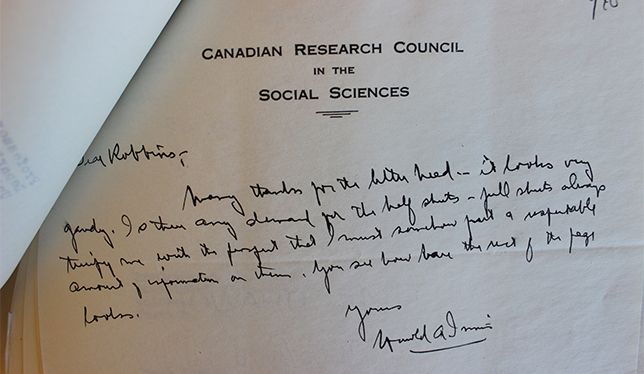
To mark its 75th anniversary, the Federation for the Humanities and Social Sciences has launched a new digital timeline marking important events in the organization’s history. “Most people don’t know we’ve been around for 75 years,” said Federation executive director Jean-Marc Mangin. “We wanted something that would be user-friendly, that could be accessed easily, to tell our story and our contribution to the world of ideas of Canada and to the intellectual development of Canada.” The launch of the timeline coincides with the Federation’s annual conference, which takes place Nov. 16 and 17 in Ottawa.
The timeline stretches from present day back to 1938, when several scholars struck a committee to get a sense of the state and scope of social science research in Canada. “It was a small group … that was concerned that there was no space for research in the social sciences in particular,” said Mr. Mangin. “So they met to protect that space and to have a voice.”
This led to the founding of the Canadian Social Science Research Council by “at best” a few hundred scholars in 1940, Mr. Mangin said. It was followed by the founding of the Humanities Research Council of Canada in 1943. Future iterations of both would merge in 1996 to form the Federation, which now counts 85,000 scholars and graduate students, said Mr. Mangin.
Artefacts and information in the timeline fall under three themes: institutional growth and change, research and programs, and “A Voice for the Humanities and Social Sciences.” They were sourced by two students in Carleton University’s master of public history program who spent hours combing through Library and Archives Canada collections. Among some of the gems they uncovered was a cheque addressed to Pierre Trudeau for help editing a manuscript for the publishing program in 1957, and handwritten notes by Canadian Social Science Research Council co-founder Harold Innis and other intellectual heavyweights such as Northrop Frye and Georges-Henri Lévesque.
One of Mr. Mangin’s favourites is a rousing excerpt of a letter from Lester Pearson to the Humanities Research Council of Canada on their 20th anniversary: “For sure, in our world of 1964, a world that sometimes threatens to become addicted to technocracy, we need the humanities more than ever, so that the ‘culture’ of science will be counselled by the ‘culture’ of the humanities, for the peaceful benefit and betterment of mankind.”
The trip down memory lane had its sombre moments that still resonate today, including a competitive funding environment that pitted the humanities and social sciences against the natural sciences, math and engineering; anti-intellectual rhetoric by governments that served to undercut the disciplines’ value; and more than one anecdote of just-in-time solutions to pull the Federation back from the brink of bankruptcy.
But there were also some big wins, said Mr. Mangin, such as the council contributing to the 1949 Massey Commission, a report on the state of Canadian cultural production which led to the founding of the Canada Council for the Arts; and the council’s call for a national research funding body for the humanities and social sciences. “We have a direct relationship to the development of the research landscape in Canada, to the growth of our community, to the growth of universities in the 1960s and ’70s,” Mr. Mangin said.
As much as the timeline is an exercise in looking back, it’s also about looking ahead. “As we launch our 2016-2020 strategic plan, with 2017 [and the Canada 150 celebrations] around the corner, we definitely want to be part of national conversations – and trigger some new ones,” he said.